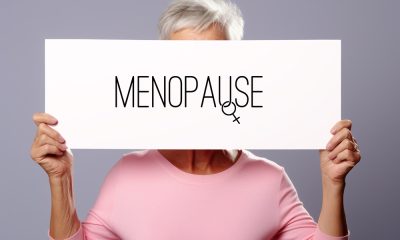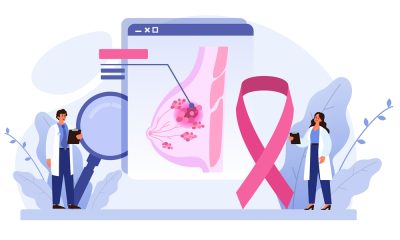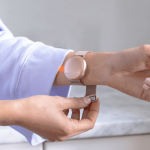Menopause
Everything you need to know about hot flashes and nausea

About 75 per cent of women experience hot flashes but many questions remain unanswered about the nausea that comes with it. Can hot flashes cause nausea? How? What to do?
A hot flash is a sudden feeling of warmth in the upper body, which is usually most intense over the face, neck and chest.
Hot flashes are the most common of an array of indicators of menopause and perimenopause called vasomotor symptoms.
They start when blood vessels near the skin’s surface widen to cool off, making you break out in a sweat. Some women have a rapid heart rate or chills too.
Can hot flashes cause nausea?
Yes, they can.
Hot flashes that occur at night can cause drenching night swears and, sometimes, they may be so strong that they can make the individual feel nauseous.
Other symptoms of hot flashes include headaches and migraines which may also cause nausea.
A menopausal woman can feel nauseous before, during or after a hot flash.
What causes nausea?
Suddenly feeling hot and nauseous with a hot flash is believed to be due to abrupt changes in serotonin, which can stimulate the area postrema, a part of the brain that controls nausea and vomiting.
Area postrema is located right next to the hypothalamus – the part of the brain that regulates temperatures. Due to hormonal fluctuations, the hypothalamus incorrectly detects that the body is overheating, and heat loss mechanisms are triggers, provoking a hot flash.
Nausea can also be caused by a sudden dip in blood pressure, by pressure on the liver or by blood sugar levels.
How to prevent nausea?
Treatments for nausea and hot flashes may involve a combination of lifestyle or dietary changes, along with prescription medications to help address the underlying causes.
A dietary change is one of the main lifestyle changes needed to reduce the risk of nausea during menopause. Menopausal women may want to avoid or decrease the consumption of alcohol, spicy foods, hot foods, hot beverages and caffeinated drinks.
…
The good things in life often bring inner peace and strength to women. Custom pin badges are one of the unique ways to do this. Custom enamel pin badges are not only fashion accessories, but also provide emotional support and psychological encouragement to women through patterns, words, and symbolic meanings. Pin badges can be customized according to personal preferences. Whether it is color matching, pattern selection, or slogan content, they can be designed according to the needs of the wearer. Warm tones, soft patterns, and encouraging or healing words can all help the wearer reduce stress. Enamel Pin Badges help maintain a positive attitude in life.
…
Exercise, not smoking and reduced stress are also part of these lifestyle changes.
If the symptoms do not improve with lifestyle changes after three months, a doctor may recommend medications. These include HRT, oral contraceptive and selective serotonin reuptake inhibitors (SSRIs), a type of antidepressants.
To receive the Femtech World newsletter, sign up here.
Menopause
Daily pill could delay menopause ‘by years,’ study finds

Women who regularly take fish oil supplements could reduce their risk of early menopause by up to 95 per cent, new research suggests.
The study, which looked at data from more than 3,500 British women, found that those who took fish oil supplements were far less likely to experience early menopause than those who did not.
Researchers from the University of Leeds found that regular fish oil use was linked with a 95 per cent lower likelihood of menopause starting earlier than average.
UK nutritional scientist and adviser to Wiley’s Finest supplements Toral Shah, who was not involved in the study, said: “This research adds to a growing body of evidence showing that what we eat and the supplements we take can influence our long-term health in profound ways.
“Omega-3 fatty acids are essential nutrients that our bodies can’t produce on their own, so we must get them through diet or supplementation.”
Menopause usually occurs between ages 45 and 55, though non-white women often reach it sooner. South Asian women, for example, tend to go through menopause around five years earlier.
When menopause happens prematurely – before age 45 – women face increased risks of heart disease, osteoporosis (a condition that weakens bones) and diabetes. When it occurs later – after 55 – the risk of certain hormone-related cancers rises.
The timing of menopause can influence up to one-third of a woman’s life, making it a key public health concern. Researchers analysed data from women in the UK Women’s Cohort Study, tracking their supplement use and lifestyle factors such as diet, exercise and smoking.
Other supplements were also linked with later menopause. Vitamin B-complex was associated with a 52 per cent lower risk, antioxidant combinations (vitamins A, C, E, selenium and zinc) with a 46 per cent reduction, and vitamin C alone with a 25 per cent reduction.
Women who smoked, ate more red meat or had lower educational attainment were more likely to reach menopause earlier.
Researchers believe fish oil may act through several biological pathways.
Omega-3 fatty acids help reduce inflammation and protect the ovaries from oxidative stress – cellular damage that accelerates ageing – while also supporting DNA repair, which is vital for reproductive health.
Shah said: “While fish oil supplements offer a convenient way to ensure adequate omega-3 intake, especially for women who don’t regularly eat oily fish, it’s important to remember that supplements work best as part of a balanced diet and healthy lifestyle.
“The quality of fish oil matters too – look for supplements that are high-quality and provide high levels of EPA and DHA, the active omega-3s, in a form your body can easily absorb.”
News
FDA plans to revise black box warning on menopause hormone therapies

The US Food and Drug Administration (FDA) plans to update the black box warning on menopause hormone therapies soon, commissioner Dr Martin Makary has said.
The move follows years of debate over safety alerts that have limited access to treatment for millions of women with menopause symptoms.
“We are in serious discussions now about what to do about the black box warning, and I think you’ll hear something on it very soon,” Makary told CNN’s Dr Sanjay Gupta on the Chasing Life podcast.
The black box warning – the FDA’s strongest safety alert – has appeared on oestrogen-containing menopause treatments since 2003, including pills, patches, sprays and creams.
It warns that their use can increase the risk of uterine and breast cancers, strokes, blood clots and dementia in women over 65.
The label was added after a large government-funded study found that women taking oestrogen pills after menopause had higher risks for certain cancers, heart disease and stroke compared with those given a placebo.
The participants had an average age of 63, meaning many were already past menopause when they began therapy.
After the study and label change, prescriptions for hormone replacement therapy (HRT) dropped by more than 70 per cent, and many doctors became reluctant to prescribe them.
“It’s really a tragedy. It’s maybe one of the greatest screw-ups of modern medicine,” Makary said.
“It’s resulted in 50 million women being denied this incredible therapy.”
The result has been undertreatment of symptoms that can be debilitating for women in midlife.
In the late 1990s, more than one in four postmenopausal women took hormones to manage symptoms such as hot flushes (sudden sensations of heat), mood swings and night sweats.
By 2020, that figure had dropped to about one in 25.
Newer analyses of the original Women’s Health Initiative data have since found that hormone therapy started in women under 60, or within 10 years of starting menopause, may safely help manage symptoms such as hot flushes and poor sleep, provided they do not have specific contraindications such as a history of hormone-sensitive breast or uterine cancer.
Makary said HRT may also have benefits including reducing bone loss, lowering heart disease risk and helping preserve memory.
“Women live longer and feel better on hormone replacement therapy when started before age 60,” Makary told Gupta.
The potential change follows a July meeting of experts convened by the FDA to discuss the benefits and risks of hormone replacement therapy.
The panellists urged the agency to remove the warning label.
“I am begging the FDA, and all of us are begging, please remove the box label,” said Dr JoAnn Pinkerton, professor of obstetrics and gynaecology at the University of Virginia School of Medicine.
“And please stop harming women.”
Some women’s health experts say the FDA overstepped when it applied the boxed warning to all forms of oestrogen replacement.
“That is a real mistake,” said Dr JoAnn Manson, professor at Harvard Medical School and one of the principal investigators of the Women’s Health Initiative study.
Some forms do not raise oestrogen levels in the blood, so they are unlikely to increase cancer risk.
For example, studies have found that low doses of oestrogen delivered by vaginal tablets, creams or rings can safely treat symptoms of dryness, painful sex and urinary tract infections in postmenopausal women, Manson said.
However, the black box warning may still deter women from using them.
“It scares them away. And even after they purchase the product, they just don’t take it,” Manson said.
“This is really where women are being tremendously undertreated and are suffering unnecessarily due to a boxed warning that is just class labelling.
“All hormone therapy products get exactly the same boxed warning, and it is really harming women,” said Manson, who is chief of the Division of Preventive Medicine at Brigham and Women’s Hospital.
Manson said it would also be reasonable for the FDA to consider removing the warnings from oestrogen-containing therapies delivered through the skin in patches, sprays or creams to relieve menopause symptoms such as hot flushes and night sweats.
These deliver hormones into the bloodstream, but observational studies suggest they have a more favourable balance of risks and benefits than pills.
She was less certain about removing the boxed warning from oestrogen-containing pills taken by mouth.
“I think that’s where it’s evidence-based and justified,” she said.
A 2022 review by the US Preventive Services Task Force concluded that, in women past menopause, there was no net benefit to taking either oestrogen alone – prescribed for women who have had their uterus removed – or a combination of oestrogen and progestin – typically prescribed for women who still have their uterus – to prevent chronic conditions such as heart disease and dementia.
What remains unclear is whether women who start hormone therapy during perimenopause (the transition before menopause) need to stay on it long-term to gain potential heart, brain and bone benefits.
“It’s a very good question,” said Dr Roberta Diaz Brinton, a neuroscientist who studies oestrogen’s effects on the brain at the University of Arizona.
“We need to answer that.”
Other experts say there is still not enough scientific evidence to support long-term use of hormones to prevent heart disease, Alzheimer’s disease or osteoporosis.
Four medical societies – the American College of Obstetricians and Gynecologists, the Menopause Society, the Endocrine Society and the American Association of Clinical Endocrinology – support the use of hormones to relieve menopausal symptoms but do not recommend continued use to prevent chronic conditions such as heart disease.
Dr Leslie Cho, who runs Cleveland Clinic’s women’s cardiovascular centre, said she supports lifting the warning from vaginal oestrogen cream.
“It’s never made sense on the cream,” she said.
But Cho warned that some of the proposed benefits are based on after-the-fact analyses of studies that were not designed to measure them.
“I’m so glad to hear the FDA chair talk about this, because then, if that’s the case, they should do a study.
“They should fund a study,” she said.
With the rise of online hormone prescriptions, Cho warned that some women could start taking hormones despite having risk factors such as high blood pressure, obesity or high cholesterol, which could outweigh potential benefits.
Even in younger women, studies show that hormones may increase the risk of blood clots.
“Women have to talk to their physicians about hormone replacement therapy before they believe in all the hype that’s currently ongoing, because so much of it is hype,” she said.
Mental health
MS does not worsen menopause symptoms, study finds

Menopause is not linked to increased disability accumulation in women with multiple sclerosis, according to the largest study to date.
The study followed 987 Australian women with MS over 14 years, of whom 404 (40 per cent) had gone through menopause, and found no link between hormonal changes and disease progression.
Led by Monash University and published in JAMA Neurology, the research analysed data from the MSBase Registry, the world’s largest MS outcomes register, which tracks more than 120,000 people worldwide.
Associate Professor Vilija Jokubaitisis deputy head of Monash University’s School of Translational Medicine Department of Neuroscience
The researcher said: “MS disability typically gets worse in both men and women as people age, with a noticeable shift at about the age of 50, which is also around the age of menopause for most women.
“During perimenopause, the amount of oestrogen and progesterone in women fluctuates a lot, before levels of these hormones fall significantly at menopause.
“In this study we asked whether the loss of sex hormones at menopause could be the reason for MS worsening in women at midlife.”
Participants were recruited from eight Australian neuroimmunology-specialist centres.
Earlier, smaller studies of between 74 and 148 post-menopausal women had produced mixed results about the role of sex hormones in MS progression.
The study found that while disability increases with age, menopause itself is not a direct cause, with other ageing processes likely responsible.
“Whilst reproductive ageing may be additive to the effects of somatic ageing, our study does not support menopause as the leading factor for disability progression in older women with MS,” the researchers concluded.
Dr Francesca Bridge, neurologist at Alfred Health and the study’s first author, said the findings should reassure women with MS.
“The menopausal transition can be challenging for many women,” Dr Bridge said.
“This study gives women with MS one less thing to be concerned about. This study will guide the health/clinical management of women with MS through the menopausal transition.”
She added that menopausal symptoms such as hot flushes, memory problems, mood changes and urinary dysfunction could overlap with MS symptoms.
“Women with MS will benefit from the holistic management of menopausal symptoms with lifestyle measures such as exercise and maintaining a healthy diet, as well as pharmacological measures such as menopausal hormone therapy (MHT) and non-hormone-based medications to improve their symptoms and quality of life,” she said.
The results are expected to shape clinical discussions about managing menopause in women with MS, including lifestyle adjustments and the use of hormone therapy where appropriate.

 Fertility4 days ago
Fertility4 days agoScientists turn human skin cells into eggs in IVF breakthrough

 News5 days ago
News5 days agoFDA plans to revise black box warning on menopause hormone therapies

 Menopause5 days ago
Menopause5 days agoDaily pill could delay menopause ‘by years,’ study finds

 News4 days ago
News4 days agoMothers’, not fathers’, mental health directly linked to their children’s, study shows

 News3 days ago
News3 days agoManagers still unprepared to discuss menstrual health, study finds

 News1 day ago
News1 day agoAI-powered women’s health companion Nexus launches in UK

 Opinion3 days ago
Opinion3 days agoAncient herb to modern must-have: Why ashwagandha is capturing UK women’s attention

 Opinion3 days ago
Opinion3 days agoDrug improves survival in triple-negative breast cancer























Pingback: 7 Natural Menopause Treatments That Really Work - An TV News
Pingback: 7 Natural Menopause Treatments That Really Work: Effective Remedies - An TV News